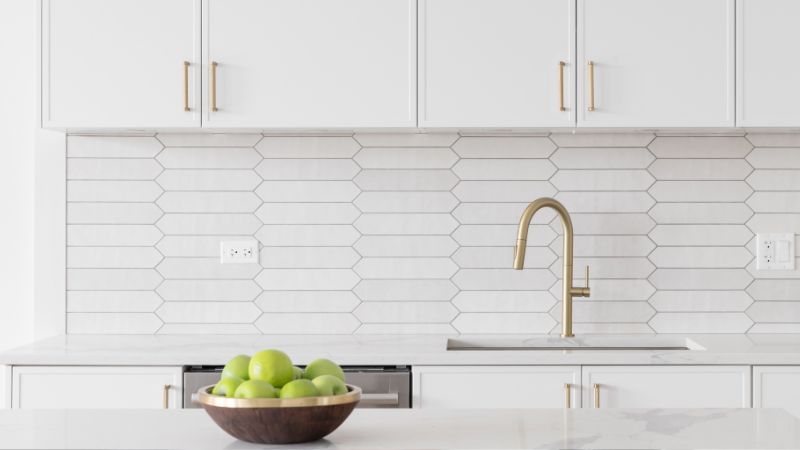Small daily actions and regular upkeep can do wonders for maintaining the beauty of countertops. Countertop maintenance shouldn’t cause headaches, but there are a few things to know before going into it. Different stones and materials require different kinds of upkeep to keep them in top form for years to come. From cleaning stains to repairing small scratches, here are 6 of the best countertop maintenance tips.
Remove Stains Promptly
When it comes to stains, countertop maintenance tips may differ depending on who you speak to. However, it all starts with as soon as you notice a stain, to try your best to remove it as quickly as possible. There are two things to consider when treating stains. One, is the material of the countertop and two, is the nature of the spill. Depending on these factors, there will be various stain removal methods. Take one search online and you can find hundreds of different approaches! It’s a matter of knowing which of these methods is legitimately safe to try.
In general, it is best to avoid acidic substances as they can etch the surface. Using pH-neutral cleaners is a safer option. For granite, laminate, stainless steel, and marble, you may be able to remove stains with a paste of baking soda and warm water. Simply let it rest for 5-10 minutes then gently scrub. However, it is abrasive so it may be damaging if scrubbed on too long. Rinse with warm water and dry with a cloth.
If you’re unsure if a product is safe for your specific countertop, contact the cleaning product’s company. Or, you can ask the company who provided and installed the countertops for their opinion. Contacting the company itself can provide peace of mind that it will be done correctly and safely and we recommend doing so. If anyone should know about countertop maintenance tips, it’s the provider of your countertops!
Clean Kitchen Countertops
Cleaning the countertops regularly is one of the best ways to keep them in good condition. To begin, remove visible crumbs and other loose debris with a gentle cloth or moist paper towel. Special brushes are also available if you want to go the extra mile. Then, use a safe cleaning solution for your specific countertop material.
Granite, quartz, andnon-porous surfaces react well to simple mild dish soap and water. Using chemicals and scrubs that may be too harsh or abrasive can tarnish the surface, so sticking with soft cloths or sponges can do the trick. Then, rinse the surface thoroughly.
Even the safest cleaning products can cause damage if left on the surface for too long. To rinse the cleaner off, use a fresh cleaning cloth dampened with warm water. This will ensure any residue from the cleaner is removed. If you still see residue, rinse for a second time. Dry the countertops well with a soft, clean towel or cloth to help prevent water spots.
Maintain A Proper Sealing Schedule
Some stones may not need to be sealed as often, but for more porous countertops, it’s best to have them resealed once a year. A few high-grade sealants can even last for two to three years. It is recommended to follow the suggestions offered by your countertop provider.
Follow Maintenance Tips For The Specific Material
Depending on the countertop’s material, different maintenance considerations are required. Granite, quartz, marble, terrazzo, and porcelain are not to be treated in the same way. Taking the appropriate measures for each material will ensure they last as long as possible.
Be Mindful of Heat
In most cases, a countertop is selected by weighing the pros and cons of each material. Whether it is resistant to heat or scratches is usually a deciding factor when deciding if it is suitable for a home.
It is important to keep countertops away from hot substances and tools they may not be able to withstand. Hot pads and protective mats are important preventative methods for keeping countertops safe from damaging heat.
In the event of exposure to damaging heat, some form of repair may be done, such as stone epoxies for smaller cracks. However, we wouldn’t want to do more harm than good so requesting aid from a professional is advised.
Use Cutting Boards
Both natural and engineered materials are more suitable for use in the kitchen due to their ability to resist damage. Quartz and granite, for example, can resist scratches from knife work. However, just because certain materials can hold up well, doesn’t mean they should.
While it’s enticing not to worry about needing cutting boards, the cons of using the stone countertop for direct slicing and dicing outweigh the pros. As with heat damage, a professional will be able to repair some of the damage. Although, this can be costly and it is best to avoid the damage completely.
It’s also possible that a cutting board was installed directly in with your countertops. This board will require maintenance separate from the stone. Usually, wooden cutting board stains are handled by covering them with salt. They are then rubbed down with a lemon and rinsed with water and vinegar. Be mindful that these acidic liquids may etch the countertop itself. Extra care is required if this is your chosen method. You don’t want to clean one area just to have damaged another!
In The Event of Repairs
No matter how well countertops are maintained, accidents and the natural passing of time happen! For damaged countertops, Granite Prestige specializes in restoring their appearance and functionality.
It doesn’t matter if it’s a crack, stain, chip, or scratch, we have it covered! The Granite Prestige technicians know how to seal, fill, and refinish the surface. It will be brought back to its full potential. Which, allows you to enjoy the countertop like you did when you first installed it.
Call us at (514) 331-8337 or at info@graniteprestige.com. You can also stay current with our latest news by following us on Facebook and Instagram.


